2024年广东省英语中考总复习动词和动词短语练习 (无答案)
文档属性
| 名称 | 2024年广东省英语中考总复习动词和动词短语练习 (无答案) |
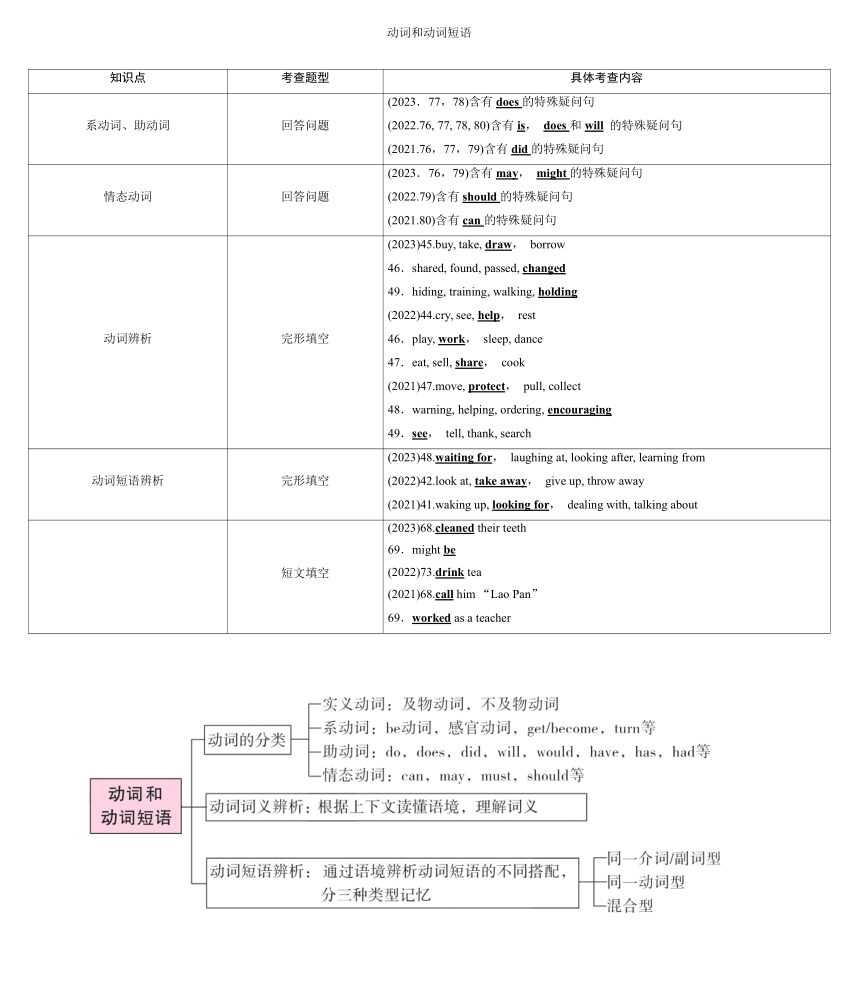
|
|
| 格式 | docx | ||
| 文件大小 | 690.8KB | ||
| 资源类型 | 教案 | ||
| 版本资源 | 通用版 | ||
| 科目 | 英语 | ||
| 更新时间 | 2024-04-20 00:00:00 | ||
图片预览

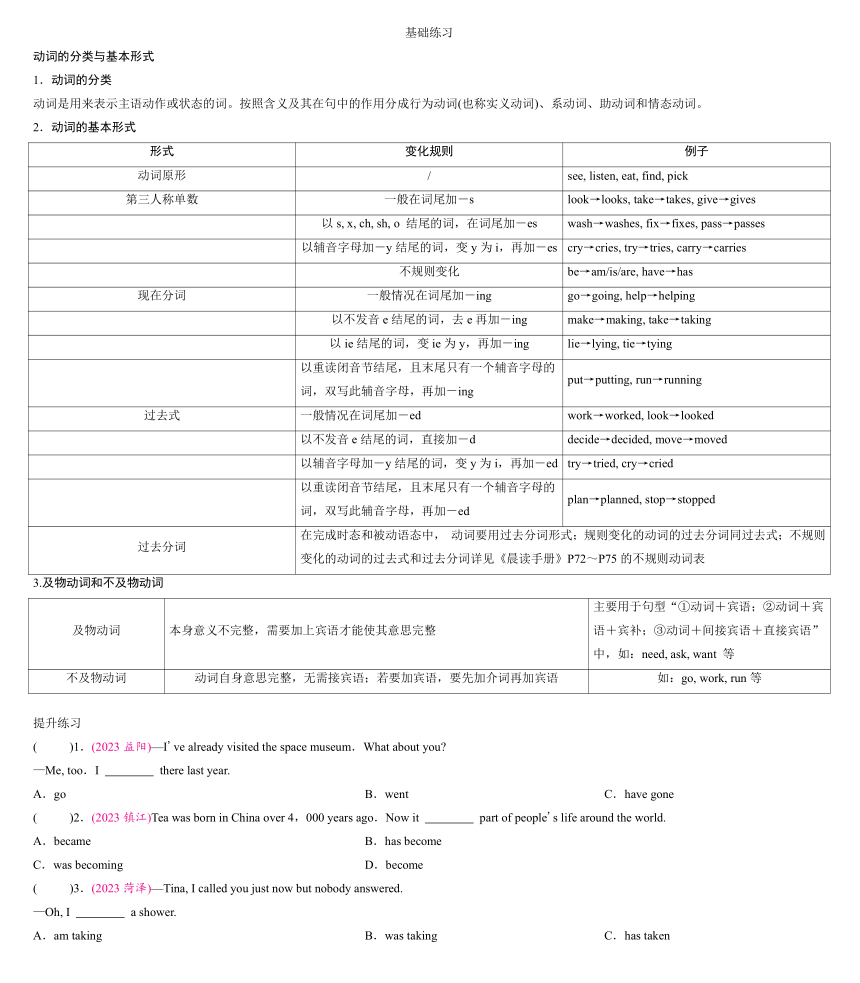
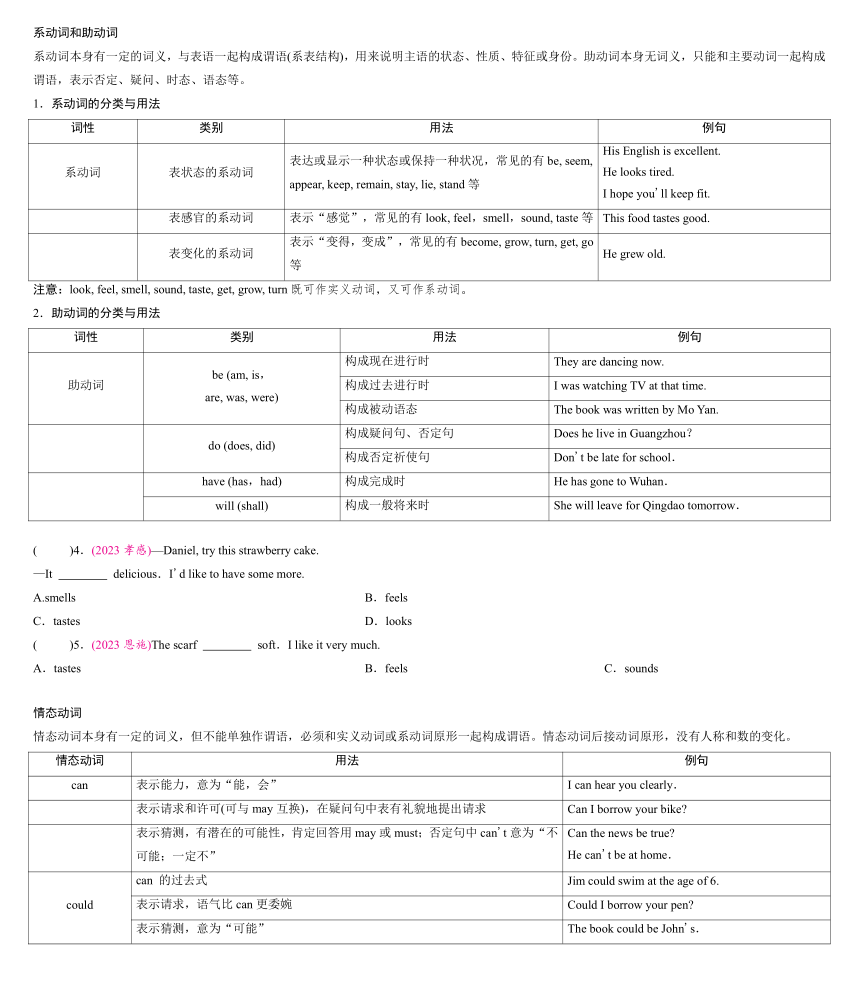
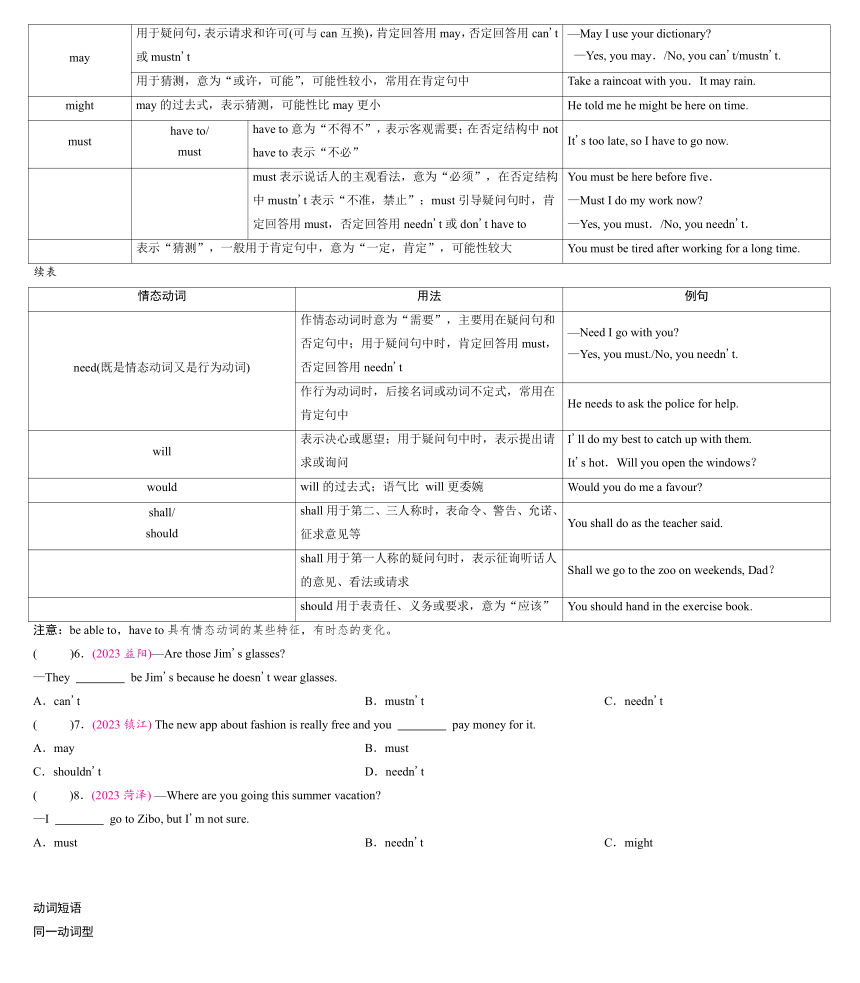
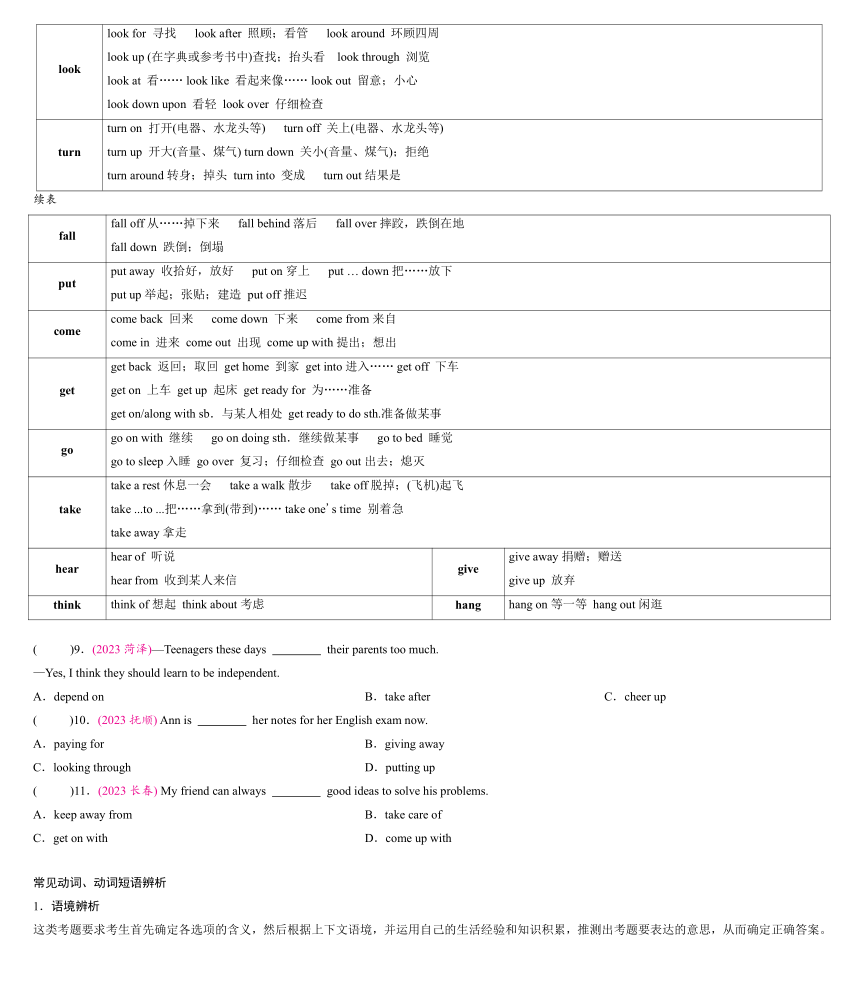
文档简介
动词和动词短语
知识点 考查题型 具体考查内容
系动词、助动词 回答问题 (2023.77,78)含有does的特殊疑问句 (2022.76, 77, 78, 80)含有is, does和will 的特殊疑问句 (2021.76,77,79)含有did的特殊疑问句
情态动词 回答问题 (2023.76,79)含有may, might的特殊疑问句 (2022.79)含有should的特殊疑问句 (2021.80)含有can的特殊疑问句
动词辨析 完形填空 (2023)45.buy, take, draw, borrow 46.shared, found, passed, changed 49.hiding, training, walking, holding (2022)44.cry, see, help, rest 46.play, work, sleep, dance 47.eat, sell, share, cook (2021)47.move, protect, pull, collect 48.warning, helping, ordering, encouraging 49.see, tell, thank, search
动词短语辨析 完形填空 (2023)48.waiting for, laughing at, looking after, learning from (2022)42.look at, take away, give up, throw away (2021)41.waking up, looking for, dealing with, talking about
短文填空 (2023)68.cleaned their teeth 69.might be (2022)73.drink tea (2021)68.call him “Lao Pan” 69.worked as a teacher
基础练习
动词的分类与基本形式
1.动词的分类
动词是用来表示主语动作或状态的词。按照含义及其在句中的作用分成行为动词(也称实义动词)、系动词、助动词和情态动词。
2.动词的基本形式
形式 变化规则 例子
动词原形 / see, listen, eat, find, pick
第三人称单数 一般在词尾加-s look→looks, take→takes, give→gives
以s, x, ch, sh, o 结尾的词,在词尾加-es wash→washes, fix→fixes, pass→passes
以辅音字母加-y结尾的词,变y为i,再加-es cry→cries, try→tries, carry→carries
不规则变化 be→am/is/are, have→has
现在分词 一般情况在词尾加-ing go→going, help→helping
以不发音e结尾的词,去e再加-ing make→making, take→taking
以ie结尾的词,变ie为y,再加-ing lie→lying, tie→tying
以重读闭音节结尾,且末尾只有一个辅音字母的词,双写此辅音字母,再加-ing put→putting, run→running
过去式 一般情况在词尾加-ed work→worked, look→looked
以不发音e结尾的词,直接加-d decide→decided, move→moved
以辅音字母加-y结尾的词,变y为i,再加-ed try→tried, cry→cried
以重读闭音节结尾,且末尾只有一个辅音字母的词,双写此辅音字母,再加-ed plan→planned, stop→stopped
过去分词 在完成时态和被动语态中, 动词要用过去分词形式;规则变化的动词的过去分词同过去式;不规则变化的动词的过去式和过去分词详见《晨读手册》P72~P75的不规则动词表
3.及物动词和不及物动词
及物动词 本身意义不完整,需要加上宾语才能使其意思完整 主要用于句型“①动词+宾语;②动词+宾语+宾补;③动词+间接宾语+直接宾语”中,如:need, ask, want 等
不及物动词 动词自身意思完整,无需接宾语;若要加宾语,要先加介词再加宾语 如:go, work, run等
提升练习
( B )1.(2023益阳)—I've already visited the space museum.What about you
—Me, too.I there last year.
A.go B.went C.have gone
( B )2.(2023镇江)Tea was born in China over 4,000 years ago.Now it part of people's life around the world.
A.became B.has become
C.was becoming D.become
( B )3.(2023菏泽)—Tina, I called you just now but nobody answered.
—Oh, I a shower.
A.am taking B.was taking C.has taken
系动词和助动词
系动词本身有一定的词义,与表语一起构成谓语(系表结构),用来说明主语的状态、性质、特征或身份。助动词本身无词义,只能和主要动词一起构成谓语,表示否定、疑问、时态、语态等。
1.系动词的分类与用法
词性 类别 用法 例句
系动词 表状态的系动词 表达或显示一种状态或保持一种状况,常见的有be, seem, appear, keep, remain, stay, lie, stand等 His English is excellent. He looks tired. I hope you'll keep fit.
表感官的系动词 表示“感觉”,常见的有look, feel,smell,sound, taste等 This food tastes good.
表变化的系动词 表示“变得,变成”,常见的有become, grow, turn, get, go等 He grew old.
注意:look, feel, smell, sound, taste, get, grow, turn既可作实义动词,又可作系动词。
2.助动词的分类与用法
词性 类别 用法 例句
助动词 be (am, is, are, was, were) 构成现在进行时 They are dancing now.
构成过去进行时 I was watching TV at that time.
构成被动语态 The book was written by Mo Yan.
do (does, did) 构成疑问句、否定句 Does he live in Guangzhou?
构成否定祈使句 Don't be late for school.
have (has,had) 构成完成时 He has gone to Wuhan.
will (shall) 构成一般将来时 She will leave for Qingdao tomorrow.
( C )4.(2023孝感)—Daniel, try this strawberry cake.
—It delicious.I'd like to have some more.
A.smells B.feels
C.tastes D.looks
( B )5.(2023恩施)The scarf soft.I like it very much.
A.tastes B.feels C.sounds
情态动词
情态动词本身有一定的词义,但不能单独作谓语,必须和实义动词或系动词原形一起构成谓语。情态动词后接动词原形,没有人称和数的变化。
情态动词 用法 例句
can 表示能力,意为“能,会” I can hear you clearly.
表示请求和许可(可与may互换),在疑问句中表有礼貌地提出请求 Can I borrow your bike
表示猜测,有潜在的可能性,肯定回答用may或must;否定句中can't意为“不可能;一定不” Can the news be true He can't be at home.
could can 的过去式 Jim could swim at the age of 6.
表示请求,语气比can更委婉 Could I borrow your pen
表示猜测,意为“可能” The book could be John's.
may 用于疑问句,表示请求和许可(可与can互换),肯定回答用may,否定回答用can't或mustn't —May I use your dictionary —Yes, you may./No, you can't/mustn't.
用于猜测,意为“或许,可能”,可能性较小,常用在肯定句中 Take a raincoat with you.It may rain.
might may的过去式,表示猜测,可能性比may更小 He told me he might be here on time.
must have to/ must have to意为“不得不”,表示客观需要;在否定结构中not have to表示“不必” It's too late, so I have to go now.
must表示说话人的主观看法,意为“必须”,在否定结构中mustn't表示“不准,禁止”;must引导疑问句时,肯定回答用must,否定回答用needn't或don't have to You must be here before five. —Must I do my work now —Yes, you must./No, you needn't.
表示“猜测”,一般用于肯定句中,意为“一定,肯定”,可能性较大 You must be tired after working for a long time.
续表
情态动词 用法 例句
need(既是情态动词又是行为动词) 作情态动词时意为“需要”,主要用在疑问句和否定句中;用于疑问句中时,肯定回答用must,否定回答用needn't —Need I go with you —Yes, you must./No, you needn't.
作行为动词时,后接名词或动词不定式,常用在肯定句中 He needs to ask the police for help.
will 表示决心或愿望;用于疑问句中时,表示提出请求或询问 I'll do my best to catch up with them. It's hot.Will you open the windows?
would will的过去式;语气比 will更委婉 Would you do me a favour
shall/ should shall用于第二、三人称时,表命令、警告、允诺、征求意见等 You shall do as the teacher said.
shall用于第一人称的疑问句时,表示征询听话人的意见、看法或请求 Shall we go to the zoo on weekends, Dad?
should用于表责任、义务或要求,意为“应该” You should hand in the exercise book.
注意:be able to,have to具有情态动词的某些特征,有时态的变化。
( A )6.(2023益阳)—Are those Jim's glasses
—They be Jim's because he doesn't wear glasses.
A.can't B.mustn't C.needn't
( D )7.(2023镇江) The new app about fashion is really free and you pay money for it.
A.may B.must
C.shouldn't D.needn't
( C )8.(2023菏泽) —Where are you going this summer vacation
—I go to Zibo, but I'm not sure.
A.must B.needn't C.might
动词短语
同一动词型
look look for 寻找 look after 照顾;看管 look around 环顾四周 look up (在字典或参考书中)查找;抬头看 look through 浏览 look at 看…… look like 看起来像…… look out 留意;小心 look down upon 看轻 look over 仔细检查
turn turn on 打开(电器、水龙头等) turn off 关上(电器、水龙头等) turn up 开大(音量、煤气) turn down 关小(音量、煤气);拒绝 turn around转身;掉头 turn into 变成 turn out结果是
续表
fall fall off从……掉下来 fall behind落后 fall over摔跤,跌倒在地 fall down 跌倒;倒塌
put put away 收拾好,放好 put on穿上 put … down把……放下 put up举起;张贴;建造 put off推迟
come come back 回来 come down 下来 come from来自 come in 进来 come out 出现 come up with提出;想出
get get back 返回;取回 get home 到家 get into进入…… get off 下车 get on 上车 get up 起床 get ready for 为……准备 get on/along with sb.与某人相处 get ready to do sth.准备做某事
go go on with 继续 go on doing sth.继续做某事 go to bed 睡觉 go to sleep入睡 go over 复习;仔细检查 go out出去;熄灭
take take a rest休息一会 take a walk散步 take off脱掉;(飞机)起飞 take ...to ...把……拿到(带到)…… take one's time 别着急 take away拿走
hear hear of 听说 hear from 收到某人来信 give give away捐赠;赠送 give up 放弃
think think of想起 think about考虑 hang hang on等一等 hang out闲逛
( A )9.(2023菏泽)—Teenagers these days their parents too much.
—Yes, I think they should learn to be independent.
A.depend on B.take after C.cheer up
( C )10.(2023抚顺) Ann is her notes for her English exam now.
A.paying for B.giving away
C.looking through D.putting up
( D )11.(2023长春) My friend can always good ideas to solve his problems.
A.keep away from B.take care of
C.get on with D.come up with
常见动词、动词短语辨析
1.语境辨析
这类考题要求考生首先确定各选项的含义,然后根据上下文语境,并运用自己的生活经验和知识积累,推测出考题要表达的意思,从而确定正确答案。
2.近义词/短语辨析
对于具有相近含义的动词(短语)之间的不同点,主要从语法角度区分其不同之处。
(1)arrive, get与reach
①arrive in +大地点名词;arrive at +小地点名词。
②get to +地点名词。
③reach+地点名词。
(2)borrow, lend与keep
①borrow表示主语“借入”某物,常与from 连用。
②lend表示主语“借出”某物,常与to 连用。
③keep意为“借;保存”时,是延续性动词,通常表示借(保存)某物多长时间,多接表示一段时间的短语或与疑问词组how long连用。
(3)dress, put on与wear
①dress sb.表示给某人穿衣服。
②put on意为“穿上;戴上”,强调穿衣服的动作。
③wear意为“穿着;戴着”,强调穿戴的状态。
(4)see, look, watch与read
①see 意为“看见;看到”,强调看到的结果。
②look意为“看”,强调看的动作,是不及物动词。
③watch指观看(比赛、电视)等。
④read 指看书、看报等,表示阅读。
(5)bring, take, carry与fetch
①bring意为“拿来;带来”,表示拿到说话人的地方。
②take意为“拿走;带走”,表示拿到别处。
③carry意为“扛,搬”,表示用力移动,没有方向性。
④fetch 意为“去取;去拿”,表示往返。
(6)speak, say, talk与tell
①speak意为“发言;讲话”,是不及物动词。
②say是及物动词,后接说话的内容。
③talk是不及物动词,后面跟人时用介词to 或with,意为“同某人谈话”; 后面跟“事情”时用介词about,意为“谈论某事”。
④tell 意为“讲述,告诉”,是及物动词; tell sb.(to do)sth.告诉某人(去做)某事。
(7)spend, take, pay与cost
①spend表示花费时间或金钱,常用于“sb.spend … on sth./(in) doing sth.”句型。
②take表示花费时间,常用于“It+takes/took+时间+to do sth.”句型。
③pay意为“支付”,常用于“sb.pay … for …”句型。
④cost 的主语是物或事,意为“值(花了)多少钱”。
(8)look for, find与find out
①look for意为“寻找”,强调寻找的过程。
②find意为“找到”,强调寻找的结果。
③find out意为“弄清楚,查明”,指查清一件事情或某个情况等。
(9)beat与win
①beat指“打败;击败”对手、对方。
②win指“赢得”比赛、地位、战斗等。
(10)join, take part in与attend
①join 一般指加入党派或组织,如参军、入党等。
②take part in 指参加某种活动。
③attend 指出席会议,含“到场”之意。
(11)used to与be used to
①used to do sth.意为“过去常常做某事”。
②be used to doing sth.意为“习惯于做某事”;be used to do sth.意为“被用来做某事”。
(12)accept与receive
①accept意为“接受”,表示主观意愿。
②receive意为“接到;收到;受到”,表示客观情况,与主观意愿无关。
(13)agree to与agree with
①agree to意为“同意;应允”,通常指同意某件事情。
②agree with意为“同意;赞同”,agree with sb.表示同意某人的意见或观点。
(14)wish, want, hope与expect
①wish意为“祝愿,祝福”。
②want意为“想”,常用于want to do sth.或want sb.to do sth.等结构。
③hope意为“希望”,表示对愿望抱信心,不可使用hope sb.to do sth.。
④expect意为“期待;期盼;盼望;预料”,指对某一事件或事物抱有期望。常用于expect to do sth.结构。
(15)improve, increase, raise与rise
①improve指状态或性质上的改进,能力的提高。
②increase指数量、强度和大小等的扩大、增长。
③raise意为“抬高;提起”,是及物动词。
④rise指河水、价格等“上升;上涨”,是不及物动词。
( C )12.(2023自贡)—Could I the book for two more days
—Sorry, you can't.You must follow our rules.
A.borrow B.lend C.keep
( B )13.(2023青海) According to the World Happiness Report 2023, Finland(芬兰) is the world's happiest country.People more time with families and friends there.
A.cost B.spend C.pay
强化训练
动词在完形填空中的运用
★1.语境推断法
①(2023广东)She decided to 45 a picture of the tree each day.
45.A.buy B.take
C.draw D.borrow
【思路点拨】根据句意可知,此处指她决定每天画一幅画,此处考查动词短语draw a picture“画画”。故选C。
②(2023广东) When she entered the house, Mum and Dad were 48 her on the sofa.
48.A.waiting for B.laughing at
C.looking after D.learning from
【思路点拨】根据语境及句意可知,此处指当她进入房子时,爸爸妈妈正在沙发上等她。故选A。
★2.常识推断法
(2023广东)The leaves slowly 46 their colour and tiny apples appeared among them.
46.A.shared B.found
C.passed D.changed
【思路点拨】根据常识及设空后的“colour”可知,此处指叶子改变了颜色,小苹果出现在其中。故选D。
★3.固定搭配法
(2021广东)This job is to 47 the earth from germ(细菌) on things brought back from other planets.
47.A.move B.protect
C.pull D.collect
【思路点拨】根据句意可知,此处指保护地球免受外星上细菌的侵害。protect ...from ...“保护……免受……的危害”是固定搭配。故选B。
动词在短文填空中的运用
★句子结构分析法
(2023广东)It might 69 the world's earliest form of toothbrushes.
【思路点拨】分析句子结构可知,该句是主系表的句子结构,句子缺少动词,且由语境可知,此处指它可能是世界上最早的牙刷,情态动词后用动词原形。故填be。
※拓展:动词填空
课后练习
一、单项填空
( C )1.(2023陇南模拟) The boy two hours playing soccer and didn't do his homework.
A.cost B.paid
C.spent D.took
( A )2.(2023武汉模拟)—I just wonder if we will have to leave early to catch the early train.
—There's no need.The traffic be less on Saturday.
A.must B.needn't
C.can't D.should
( C )3.(2023武威模拟)—You are too busy on weekends.You need to relax yourself, Jack
—You are right!I have to a few of my activities.
A.cut off B.cut out
C.cut down D.cut into
( C )4.(2023保定三模) These flowers so sweet.I want to buy one.
A.feel B.taste
C.smell D.sound
( A )5.Our teacher us to visit museums, because it can help us learn more about history.
A.advises B.warns
C.allows D.orders
二、单句选词填空
take off feel protect can hold
1.Students closed the window hurriedly to protect their books from the rain.
2.The university is the place that holds all my best memories.
3.In Asian countries, you should take off your shoes before entering a house.
4.—I'm really nervous about my speech tomorrow.
—Don't worry.You can do it.
5.The music is very beautiful, but under the beauty I feel a strong sadness and pain.
三、小语篇特训
(一)完形填空(五育之智育)
Do you often throw away things you don't need anymore Actually, they 1 be put to good use.Nothing is a waste if you have a creative mind.For example, Amy is an unusual woman who 2 a house out of rubbish.The windows and doors 3 old buildings around her town that were pulled down.Amy is not the only one who is good at 4 .Jessica Wang from Hong Kong especially likes to use old jeans to make handbags.Her bags are cute and useful.There is another man called Wang Tao.He is known for 5 iron and other materials from old cars to make beautiful art pieces.Some are large pieces like animals and humans, some are smaller ones you can put at home.The art not only 6 happiness to us, but it also shows that even cold, hard iron can be brought back to life with a little creativity.It's important to enjoy art in our daily lives because it can make life colorful.
( D )1.A.must B.should
C.need D.can
( A )2.A.built B.bought
C.drew D.saw
( D )3.A.came on B.came up with
C.came back D.came from
( B )4.A.writing B.recycling
C.cooking D.dressing
( C )5.A.selling B.picking
C.using D.making
( B )6.A.keeps B.brings
C.creates D.shows
(二)短文填空
请从方框内选择适当的词并用其正确形式填空,使文章完整连贯。注意每空一词, 每词仅用一次,有两词为多余项。
believe seem become decide love hear sit praise
Albert Einstein was born in Germany in 1879.As a boy he was unhappy in school.
He 1.seemed to be slower than others and he often failed in his exams.Most of his teachers did not like him.However, his parents 2.loved him very much.They often said to the teachers, “Albert is a bright boy.He failed in some of the exams because he wasn't interested in those subjects.” They 3.believed their son would do something great.One day, the Einsteins and their friends were having a picnic by the riverside.Someone said, “See how the other children play and laugh, but not Albert.He just 4.sits and looks off across the river.” Albert's mother 5.heard this and said, “Albert is quiet, because he's thinking.Let's wait and see.He'll become a great scientist, I believe.” She was right.Later, Albert 6.became one of the greatest scientists in the world.He won the Nobel Prize for physics in 1921.
四、完形填空(核心素养:思维品质)
(2023武汉模拟改编)My name is Sara Li from China.Last spring, my family moved to Portland.Our 1 home had no yard.So my parents made an indoor garden.Mama planted seeds in pots and Papa hung them from hooks(勾子).With green vines(蔓生植物) of plants hanging down, the house looks 2 fantastic.Jill, a gardening lover living next door, spent much time at my home.
( D )1.A.big B.sweet
C.small D.new
( D )2.A.still B.also
C.finally D.rather
One morning, Jill and her mother came to my family.On arrival, Jill's mother said, “Jill 3 your garden.She has told me so much about it.” Mama explained that she had learned how to 4 small space.Jill's mother asked excitedly, “Can you help us with a place Our community wants to plant so much but our plot(小块土地)is very small.” Papa and Mama nodded with 5 .
( C )3.A.checks B.presents
C.admires D.values
( C )4.A.take up B.clean up
C.make use of D.fit in with
( D )5.A.worry B.fear
C.hope D.pleasure
That afternoon, everyone in the 6 agreed to contribute(捐助).Neighbors brought seeds, tools and dirt.The next day, we started the 7 .Papa built boxes of different sizes.We 8 them with dirt.The tallest stood against the back wall while the 9 in the front to make sure that all the plants would get sunlight.
( D )6.A.yard B.town
C.city D.community
( C )7.A.garden B.match
C.project D.class
( A )8.A.filled B.spread
C.supported D.picked
( B )9.A.biggest B.shortest
C.newest D.oldest
All summer, Jill and I worked there.Autumn arriving, we picked enough to have a picnic for the community, everyone 10 the joy of harvest.I was so proud that Papa and Mama brought a bit of ours to Portland.
( B )10.A.treasuring B.sharing
C.accepting D.showing
知识点 考查题型 具体考查内容
系动词、助动词 回答问题 (2023.77,78)含有does的特殊疑问句 (2022.76, 77, 78, 80)含有is, does和will 的特殊疑问句 (2021.76,77,79)含有did的特殊疑问句
情态动词 回答问题 (2023.76,79)含有may, might的特殊疑问句 (2022.79)含有should的特殊疑问句 (2021.80)含有can的特殊疑问句
动词辨析 完形填空 (2023)45.buy, take, draw, borrow 46.shared, found, passed, changed 49.hiding, training, walking, holding (2022)44.cry, see, help, rest 46.play, work, sleep, dance 47.eat, sell, share, cook (2021)47.move, protect, pull, collect 48.warning, helping, ordering, encouraging 49.see, tell, thank, search
动词短语辨析 完形填空 (2023)48.waiting for, laughing at, looking after, learning from (2022)42.look at, take away, give up, throw away (2021)41.waking up, looking for, dealing with, talking about
短文填空 (2023)68.cleaned their teeth 69.might be (2022)73.drink tea (2021)68.call him “Lao Pan” 69.worked as a teacher
基础练习
动词的分类与基本形式
1.动词的分类
动词是用来表示主语动作或状态的词。按照含义及其在句中的作用分成行为动词(也称实义动词)、系动词、助动词和情态动词。
2.动词的基本形式
形式 变化规则 例子
动词原形 / see, listen, eat, find, pick
第三人称单数 一般在词尾加-s look→looks, take→takes, give→gives
以s, x, ch, sh, o 结尾的词,在词尾加-es wash→washes, fix→fixes, pass→passes
以辅音字母加-y结尾的词,变y为i,再加-es cry→cries, try→tries, carry→carries
不规则变化 be→am/is/are, have→has
现在分词 一般情况在词尾加-ing go→going, help→helping
以不发音e结尾的词,去e再加-ing make→making, take→taking
以ie结尾的词,变ie为y,再加-ing lie→lying, tie→tying
以重读闭音节结尾,且末尾只有一个辅音字母的词,双写此辅音字母,再加-ing put→putting, run→running
过去式 一般情况在词尾加-ed work→worked, look→looked
以不发音e结尾的词,直接加-d decide→decided, move→moved
以辅音字母加-y结尾的词,变y为i,再加-ed try→tried, cry→cried
以重读闭音节结尾,且末尾只有一个辅音字母的词,双写此辅音字母,再加-ed plan→planned, stop→stopped
过去分词 在完成时态和被动语态中, 动词要用过去分词形式;规则变化的动词的过去分词同过去式;不规则变化的动词的过去式和过去分词详见《晨读手册》P72~P75的不规则动词表
3.及物动词和不及物动词
及物动词 本身意义不完整,需要加上宾语才能使其意思完整 主要用于句型“①动词+宾语;②动词+宾语+宾补;③动词+间接宾语+直接宾语”中,如:need, ask, want 等
不及物动词 动词自身意思完整,无需接宾语;若要加宾语,要先加介词再加宾语 如:go, work, run等
提升练习
( B )1.(2023益阳)—I've already visited the space museum.What about you
—Me, too.I there last year.
A.go B.went C.have gone
( B )2.(2023镇江)Tea was born in China over 4,000 years ago.Now it part of people's life around the world.
A.became B.has become
C.was becoming D.become
( B )3.(2023菏泽)—Tina, I called you just now but nobody answered.
—Oh, I a shower.
A.am taking B.was taking C.has taken
系动词和助动词
系动词本身有一定的词义,与表语一起构成谓语(系表结构),用来说明主语的状态、性质、特征或身份。助动词本身无词义,只能和主要动词一起构成谓语,表示否定、疑问、时态、语态等。
1.系动词的分类与用法
词性 类别 用法 例句
系动词 表状态的系动词 表达或显示一种状态或保持一种状况,常见的有be, seem, appear, keep, remain, stay, lie, stand等 His English is excellent. He looks tired. I hope you'll keep fit.
表感官的系动词 表示“感觉”,常见的有look, feel,smell,sound, taste等 This food tastes good.
表变化的系动词 表示“变得,变成”,常见的有become, grow, turn, get, go等 He grew old.
注意:look, feel, smell, sound, taste, get, grow, turn既可作实义动词,又可作系动词。
2.助动词的分类与用法
词性 类别 用法 例句
助动词 be (am, is, are, was, were) 构成现在进行时 They are dancing now.
构成过去进行时 I was watching TV at that time.
构成被动语态 The book was written by Mo Yan.
do (does, did) 构成疑问句、否定句 Does he live in Guangzhou?
构成否定祈使句 Don't be late for school.
have (has,had) 构成完成时 He has gone to Wuhan.
will (shall) 构成一般将来时 She will leave for Qingdao tomorrow.
( C )4.(2023孝感)—Daniel, try this strawberry cake.
—It delicious.I'd like to have some more.
A.smells B.feels
C.tastes D.looks
( B )5.(2023恩施)The scarf soft.I like it very much.
A.tastes B.feels C.sounds
情态动词
情态动词本身有一定的词义,但不能单独作谓语,必须和实义动词或系动词原形一起构成谓语。情态动词后接动词原形,没有人称和数的变化。
情态动词 用法 例句
can 表示能力,意为“能,会” I can hear you clearly.
表示请求和许可(可与may互换),在疑问句中表有礼貌地提出请求 Can I borrow your bike
表示猜测,有潜在的可能性,肯定回答用may或must;否定句中can't意为“不可能;一定不” Can the news be true He can't be at home.
could can 的过去式 Jim could swim at the age of 6.
表示请求,语气比can更委婉 Could I borrow your pen
表示猜测,意为“可能” The book could be John's.
may 用于疑问句,表示请求和许可(可与can互换),肯定回答用may,否定回答用can't或mustn't —May I use your dictionary —Yes, you may./No, you can't/mustn't.
用于猜测,意为“或许,可能”,可能性较小,常用在肯定句中 Take a raincoat with you.It may rain.
might may的过去式,表示猜测,可能性比may更小 He told me he might be here on time.
must have to/ must have to意为“不得不”,表示客观需要;在否定结构中not have to表示“不必” It's too late, so I have to go now.
must表示说话人的主观看法,意为“必须”,在否定结构中mustn't表示“不准,禁止”;must引导疑问句时,肯定回答用must,否定回答用needn't或don't have to You must be here before five. —Must I do my work now —Yes, you must./No, you needn't.
表示“猜测”,一般用于肯定句中,意为“一定,肯定”,可能性较大 You must be tired after working for a long time.
续表
情态动词 用法 例句
need(既是情态动词又是行为动词) 作情态动词时意为“需要”,主要用在疑问句和否定句中;用于疑问句中时,肯定回答用must,否定回答用needn't —Need I go with you —Yes, you must./No, you needn't.
作行为动词时,后接名词或动词不定式,常用在肯定句中 He needs to ask the police for help.
will 表示决心或愿望;用于疑问句中时,表示提出请求或询问 I'll do my best to catch up with them. It's hot.Will you open the windows?
would will的过去式;语气比 will更委婉 Would you do me a favour
shall/ should shall用于第二、三人称时,表命令、警告、允诺、征求意见等 You shall do as the teacher said.
shall用于第一人称的疑问句时,表示征询听话人的意见、看法或请求 Shall we go to the zoo on weekends, Dad?
should用于表责任、义务或要求,意为“应该” You should hand in the exercise book.
注意:be able to,have to具有情态动词的某些特征,有时态的变化。
( A )6.(2023益阳)—Are those Jim's glasses
—They be Jim's because he doesn't wear glasses.
A.can't B.mustn't C.needn't
( D )7.(2023镇江) The new app about fashion is really free and you pay money for it.
A.may B.must
C.shouldn't D.needn't
( C )8.(2023菏泽) —Where are you going this summer vacation
—I go to Zibo, but I'm not sure.
A.must B.needn't C.might
动词短语
同一动词型
look look for 寻找 look after 照顾;看管 look around 环顾四周 look up (在字典或参考书中)查找;抬头看 look through 浏览 look at 看…… look like 看起来像…… look out 留意;小心 look down upon 看轻 look over 仔细检查
turn turn on 打开(电器、水龙头等) turn off 关上(电器、水龙头等) turn up 开大(音量、煤气) turn down 关小(音量、煤气);拒绝 turn around转身;掉头 turn into 变成 turn out结果是
续表
fall fall off从……掉下来 fall behind落后 fall over摔跤,跌倒在地 fall down 跌倒;倒塌
put put away 收拾好,放好 put on穿上 put … down把……放下 put up举起;张贴;建造 put off推迟
come come back 回来 come down 下来 come from来自 come in 进来 come out 出现 come up with提出;想出
get get back 返回;取回 get home 到家 get into进入…… get off 下车 get on 上车 get up 起床 get ready for 为……准备 get on/along with sb.与某人相处 get ready to do sth.准备做某事
go go on with 继续 go on doing sth.继续做某事 go to bed 睡觉 go to sleep入睡 go over 复习;仔细检查 go out出去;熄灭
take take a rest休息一会 take a walk散步 take off脱掉;(飞机)起飞 take ...to ...把……拿到(带到)…… take one's time 别着急 take away拿走
hear hear of 听说 hear from 收到某人来信 give give away捐赠;赠送 give up 放弃
think think of想起 think about考虑 hang hang on等一等 hang out闲逛
( A )9.(2023菏泽)—Teenagers these days their parents too much.
—Yes, I think they should learn to be independent.
A.depend on B.take after C.cheer up
( C )10.(2023抚顺) Ann is her notes for her English exam now.
A.paying for B.giving away
C.looking through D.putting up
( D )11.(2023长春) My friend can always good ideas to solve his problems.
A.keep away from B.take care of
C.get on with D.come up with
常见动词、动词短语辨析
1.语境辨析
这类考题要求考生首先确定各选项的含义,然后根据上下文语境,并运用自己的生活经验和知识积累,推测出考题要表达的意思,从而确定正确答案。
2.近义词/短语辨析
对于具有相近含义的动词(短语)之间的不同点,主要从语法角度区分其不同之处。
(1)arrive, get与reach
①arrive in +大地点名词;arrive at +小地点名词。
②get to +地点名词。
③reach+地点名词。
(2)borrow, lend与keep
①borrow表示主语“借入”某物,常与from 连用。
②lend表示主语“借出”某物,常与to 连用。
③keep意为“借;保存”时,是延续性动词,通常表示借(保存)某物多长时间,多接表示一段时间的短语或与疑问词组how long连用。
(3)dress, put on与wear
①dress sb.表示给某人穿衣服。
②put on意为“穿上;戴上”,强调穿衣服的动作。
③wear意为“穿着;戴着”,强调穿戴的状态。
(4)see, look, watch与read
①see 意为“看见;看到”,强调看到的结果。
②look意为“看”,强调看的动作,是不及物动词。
③watch指观看(比赛、电视)等。
④read 指看书、看报等,表示阅读。
(5)bring, take, carry与fetch
①bring意为“拿来;带来”,表示拿到说话人的地方。
②take意为“拿走;带走”,表示拿到别处。
③carry意为“扛,搬”,表示用力移动,没有方向性。
④fetch 意为“去取;去拿”,表示往返。
(6)speak, say, talk与tell
①speak意为“发言;讲话”,是不及物动词。
②say是及物动词,后接说话的内容。
③talk是不及物动词,后面跟人时用介词to 或with,意为“同某人谈话”; 后面跟“事情”时用介词about,意为“谈论某事”。
④tell 意为“讲述,告诉”,是及物动词; tell sb.(to do)sth.告诉某人(去做)某事。
(7)spend, take, pay与cost
①spend表示花费时间或金钱,常用于“sb.spend … on sth./(in) doing sth.”句型。
②take表示花费时间,常用于“It+takes/took+时间+to do sth.”句型。
③pay意为“支付”,常用于“sb.pay … for …”句型。
④cost 的主语是物或事,意为“值(花了)多少钱”。
(8)look for, find与find out
①look for意为“寻找”,强调寻找的过程。
②find意为“找到”,强调寻找的结果。
③find out意为“弄清楚,查明”,指查清一件事情或某个情况等。
(9)beat与win
①beat指“打败;击败”对手、对方。
②win指“赢得”比赛、地位、战斗等。
(10)join, take part in与attend
①join 一般指加入党派或组织,如参军、入党等。
②take part in 指参加某种活动。
③attend 指出席会议,含“到场”之意。
(11)used to与be used to
①used to do sth.意为“过去常常做某事”。
②be used to doing sth.意为“习惯于做某事”;be used to do sth.意为“被用来做某事”。
(12)accept与receive
①accept意为“接受”,表示主观意愿。
②receive意为“接到;收到;受到”,表示客观情况,与主观意愿无关。
(13)agree to与agree with
①agree to意为“同意;应允”,通常指同意某件事情。
②agree with意为“同意;赞同”,agree with sb.表示同意某人的意见或观点。
(14)wish, want, hope与expect
①wish意为“祝愿,祝福”。
②want意为“想”,常用于want to do sth.或want sb.to do sth.等结构。
③hope意为“希望”,表示对愿望抱信心,不可使用hope sb.to do sth.。
④expect意为“期待;期盼;盼望;预料”,指对某一事件或事物抱有期望。常用于expect to do sth.结构。
(15)improve, increase, raise与rise
①improve指状态或性质上的改进,能力的提高。
②increase指数量、强度和大小等的扩大、增长。
③raise意为“抬高;提起”,是及物动词。
④rise指河水、价格等“上升;上涨”,是不及物动词。
( C )12.(2023自贡)—Could I the book for two more days
—Sorry, you can't.You must follow our rules.
A.borrow B.lend C.keep
( B )13.(2023青海) According to the World Happiness Report 2023, Finland(芬兰) is the world's happiest country.People more time with families and friends there.
A.cost B.spend C.pay
强化训练
动词在完形填空中的运用
★1.语境推断法
①(2023广东)She decided to 45 a picture of the tree each day.
45.A.buy B.take
C.draw D.borrow
【思路点拨】根据句意可知,此处指她决定每天画一幅画,此处考查动词短语draw a picture“画画”。故选C。
②(2023广东) When she entered the house, Mum and Dad were 48 her on the sofa.
48.A.waiting for B.laughing at
C.looking after D.learning from
【思路点拨】根据语境及句意可知,此处指当她进入房子时,爸爸妈妈正在沙发上等她。故选A。
★2.常识推断法
(2023广东)The leaves slowly 46 their colour and tiny apples appeared among them.
46.A.shared B.found
C.passed D.changed
【思路点拨】根据常识及设空后的“colour”可知,此处指叶子改变了颜色,小苹果出现在其中。故选D。
★3.固定搭配法
(2021广东)This job is to 47 the earth from germ(细菌) on things brought back from other planets.
47.A.move B.protect
C.pull D.collect
【思路点拨】根据句意可知,此处指保护地球免受外星上细菌的侵害。protect ...from ...“保护……免受……的危害”是固定搭配。故选B。
动词在短文填空中的运用
★句子结构分析法
(2023广东)It might 69 the world's earliest form of toothbrushes.
【思路点拨】分析句子结构可知,该句是主系表的句子结构,句子缺少动词,且由语境可知,此处指它可能是世界上最早的牙刷,情态动词后用动词原形。故填be。
※拓展:动词填空
课后练习
一、单项填空
( C )1.(2023陇南模拟) The boy two hours playing soccer and didn't do his homework.
A.cost B.paid
C.spent D.took
( A )2.(2023武汉模拟)—I just wonder if we will have to leave early to catch the early train.
—There's no need.The traffic be less on Saturday.
A.must B.needn't
C.can't D.should
( C )3.(2023武威模拟)—You are too busy on weekends.You need to relax yourself, Jack
—You are right!I have to a few of my activities.
A.cut off B.cut out
C.cut down D.cut into
( C )4.(2023保定三模) These flowers so sweet.I want to buy one.
A.feel B.taste
C.smell D.sound
( A )5.Our teacher us to visit museums, because it can help us learn more about history.
A.advises B.warns
C.allows D.orders
二、单句选词填空
take off feel protect can hold
1.Students closed the window hurriedly to protect their books from the rain.
2.The university is the place that holds all my best memories.
3.In Asian countries, you should take off your shoes before entering a house.
4.—I'm really nervous about my speech tomorrow.
—Don't worry.You can do it.
5.The music is very beautiful, but under the beauty I feel a strong sadness and pain.
三、小语篇特训
(一)完形填空(五育之智育)
Do you often throw away things you don't need anymore Actually, they 1 be put to good use.Nothing is a waste if you have a creative mind.For example, Amy is an unusual woman who 2 a house out of rubbish.The windows and doors 3 old buildings around her town that were pulled down.Amy is not the only one who is good at 4 .Jessica Wang from Hong Kong especially likes to use old jeans to make handbags.Her bags are cute and useful.There is another man called Wang Tao.He is known for 5 iron and other materials from old cars to make beautiful art pieces.Some are large pieces like animals and humans, some are smaller ones you can put at home.The art not only 6 happiness to us, but it also shows that even cold, hard iron can be brought back to life with a little creativity.It's important to enjoy art in our daily lives because it can make life colorful.
( D )1.A.must B.should
C.need D.can
( A )2.A.built B.bought
C.drew D.saw
( D )3.A.came on B.came up with
C.came back D.came from
( B )4.A.writing B.recycling
C.cooking D.dressing
( C )5.A.selling B.picking
C.using D.making
( B )6.A.keeps B.brings
C.creates D.shows
(二)短文填空
请从方框内选择适当的词并用其正确形式填空,使文章完整连贯。注意每空一词, 每词仅用一次,有两词为多余项。
believe seem become decide love hear sit praise
Albert Einstein was born in Germany in 1879.As a boy he was unhappy in school.
He 1.seemed to be slower than others and he often failed in his exams.Most of his teachers did not like him.However, his parents 2.loved him very much.They often said to the teachers, “Albert is a bright boy.He failed in some of the exams because he wasn't interested in those subjects.” They 3.believed their son would do something great.One day, the Einsteins and their friends were having a picnic by the riverside.Someone said, “See how the other children play and laugh, but not Albert.He just 4.sits and looks off across the river.” Albert's mother 5.heard this and said, “Albert is quiet, because he's thinking.Let's wait and see.He'll become a great scientist, I believe.” She was right.Later, Albert 6.became one of the greatest scientists in the world.He won the Nobel Prize for physics in 1921.
四、完形填空(核心素养:思维品质)
(2023武汉模拟改编)My name is Sara Li from China.Last spring, my family moved to Portland.Our 1 home had no yard.So my parents made an indoor garden.Mama planted seeds in pots and Papa hung them from hooks(勾子).With green vines(蔓生植物) of plants hanging down, the house looks 2 fantastic.Jill, a gardening lover living next door, spent much time at my home.
( D )1.A.big B.sweet
C.small D.new
( D )2.A.still B.also
C.finally D.rather
One morning, Jill and her mother came to my family.On arrival, Jill's mother said, “Jill 3 your garden.She has told me so much about it.” Mama explained that she had learned how to 4 small space.Jill's mother asked excitedly, “Can you help us with a place Our community wants to plant so much but our plot(小块土地)is very small.” Papa and Mama nodded with 5 .
( C )3.A.checks B.presents
C.admires D.values
( C )4.A.take up B.clean up
C.make use of D.fit in with
( D )5.A.worry B.fear
C.hope D.pleasure
That afternoon, everyone in the 6 agreed to contribute(捐助).Neighbors brought seeds, tools and dirt.The next day, we started the 7 .Papa built boxes of different sizes.We 8 them with dirt.The tallest stood against the back wall while the 9 in the front to make sure that all the plants would get sunlight.
( D )6.A.yard B.town
C.city D.community
( C )7.A.garden B.match
C.project D.class
( A )8.A.filled B.spread
C.supported D.picked
( B )9.A.biggest B.shortest
C.newest D.oldest
All summer, Jill and I worked there.Autumn arriving, we picked enough to have a picnic for the community, everyone 10 the joy of harvest.I was so proud that Papa and Mama brought a bit of ours to Portland.
( B )10.A.treasuring B.sharing
C.accepting D.showing
同课章节目录
